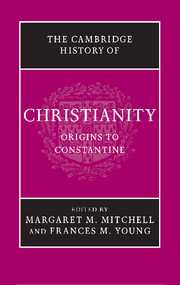Book contents
- Frontmatter
- Prelude: Jesus Christ, foundation of Christianity
- Part I The Political, Social and Religious Setting
- Part II The Jesus Movements
- Part III Community Traditions and Self-Definition
- 8 The emergence of the written record
- 9 Marcion and the ‘canon’
- 10 Self-definition vis-à-vis the Jewish matrix
- 11 Self-definition vis-à-vis the Graeco-Roman world
- 12 Self-differentiation among Christian groups: the Gnostics and their opponents
- 13 Truth and tradition: Irenaeus
- 14 The self-defining praxis of the developing ecclēsia
- Part IV Regional Varieties of Christianity in the First Three Centuries
- Part V The Shaping of Christian Theology
- Part VI ‘Aliens’ become Citizens: towards Imperial Patronage
- Conclusion: retrospect and prospect
- Bibliographies
- Index
- Map 1. The Roman Empire in the time of Marcus Aurelius
- References
14 - The self-defining praxis of the developing ecclēsia
from Part III - Community Traditions and Self-Definition
Published online by Cambridge University Press: 28 March 2008
- Frontmatter
- Prelude: Jesus Christ, foundation of Christianity
- Part I The Political, Social and Religious Setting
- Part II The Jesus Movements
- Part III Community Traditions and Self-Definition
- 8 The emergence of the written record
- 9 Marcion and the ‘canon’
- 10 Self-definition vis-à-vis the Jewish matrix
- 11 Self-definition vis-à-vis the Graeco-Roman world
- 12 Self-differentiation among Christian groups: the Gnostics and their opponents
- 13 Truth and tradition: Irenaeus
- 14 The self-defining praxis of the developing ecclēsia
- Part IV Regional Varieties of Christianity in the First Three Centuries
- Part V The Shaping of Christian Theology
- Part VI ‘Aliens’ become Citizens: towards Imperial Patronage
- Conclusion: retrospect and prospect
- Bibliographies
- Index
- Map 1. The Roman Empire in the time of Marcus Aurelius
- References
Summary
The unknown author of the Epistle to Diognetus, writing probably in the late second century to an eminent patron, claimed that Christians are just like everyone else, inhabiting every land, both Greek and barbarian, living in cities, speaking the language that everyone else speaks, and wearing and eating what everyone else wears and eats. And yet, he says, they are different in subtle and often unseen ways. While they live normal lives on earth, they know that they are really here only as resident aliens, and so they can feel at home anywhere. They are in the flesh but do not live according to it. For doing good and loving everyone, they are attacked and hated, assailed as foreigners by Jews and persecuted by Greeks (Ep. Diognet. 3–5).
This remarkable document written in defence of Christian faith and practice reflects both the clarity and the ambiguity of Christian existence in the pre-Constantinian period as its adherents began to develop a sense of their own identity. They are both like everyone else and yet, in some significant ways, different, even to the point of being a ‘third race’. The claim is put forth that being Christian did make a difference in everyday life, but not, of course, a difference that was threatening to the state or should be taken as cause for alarm by outsiders. Rather, this author and other Christian apologists like him insisted that Christians were good citizens, who were in fact not a liability but an asset to the empire.
- Type
- Chapter
- Information
- The Cambridge History of Christianity , pp. 274 - 292Publisher: Cambridge University PressPrint publication year: 2006

